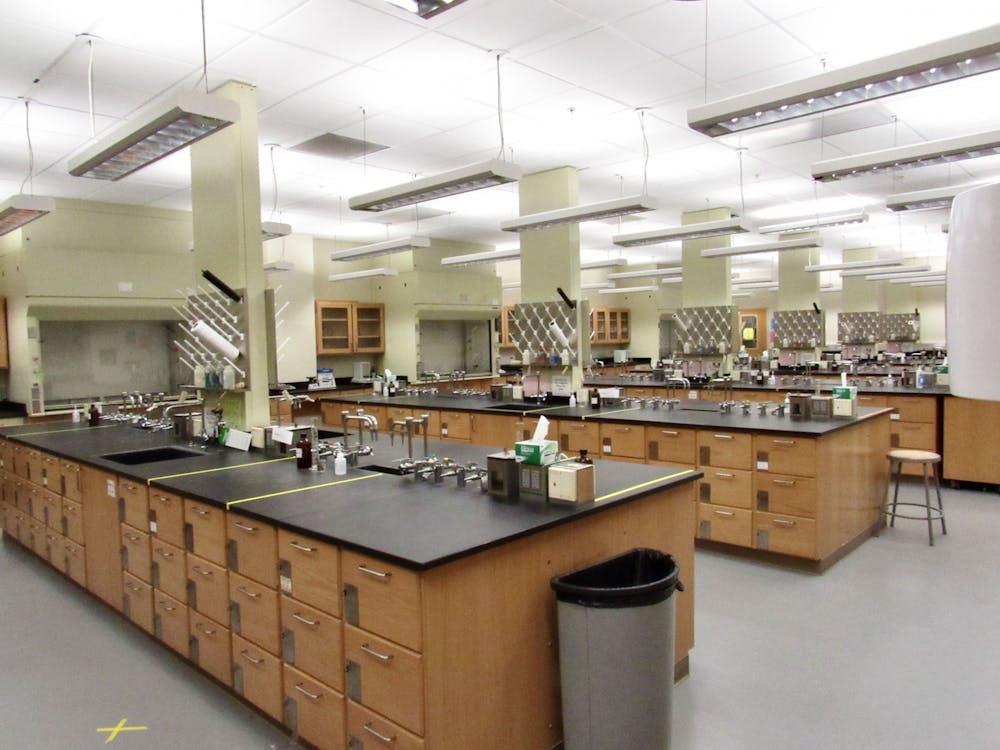Many labs have been moved online or partially online, taking away all or most of the hands-on aspects of class material because of the University’s COVID-19 guidelines. For some students, this has been a challenge.
Susanne Voltz, sophomore in chemical engineering, has two classes that require a lab this semester — biology and organic chemistry. Her biology class is fully online, while her organic chemistry class is only partially online. Voltz said the online labs are tolerable, but not ideal.
“I definitely think not having in-person labs … [means] the material won’t settle in as well,” she said. “I am a bit concerned because I am on the pre-med track, so I don’t need to take a ton of biology, but the little I do, I really have to know it. So for us to not be having in-person labs, that makes me concerned about studying for the [Medical College Admission Test].”
Right now, Voltz either takes an entrance and exit quiz online to “complete” her lab, or she goes in person every other week. Not meeting in person makes it harder for her and her classmates to understand the material, and it’s hard to not be in labs when you’re a hands-on learner, she said.
Voltz said one positive thing about the lab structure is that some are only partially online. According to her, she would structure the labs the same way as Auburn has because of this unique situation.
“At least we are not all the way virtual,” Voltz said. “I definitely think [Auburn] is doing the best they can. The professors are very aware of the situation, and I think they are trying to compensate as much as possible … there’s only so much virtual substitution that can happen.”
Another student, Nina Orihuela, is a sophomore in chemistry with a pre-med concentration. She, like Voltz, is taking two labs this semester, one fully online and one partially online. Orihuela said she loves school and she really enjoys having labs in person.
“My first organic chemistry lab was on Monday, and I actually really enjoyed it,” Orihuela said. “I love school, so I have really struggled with COVID and not being able to go to my classes [in person].”
For Orihuela, the lab is important to her because it allows her to see how in-class instruction applies to real life. She, like Voltz, is a hands-on learner and says that not being able to go to an in-person lab has limited her comprehension of the class material.
“No one loves to go to the 8 a.m. chem lab,” Orihuela said. “But at the same time, you go to lab to see the real-life version of what you’re learning. [Lab] is there to show you that what you’re learning matters.”
Kyle Willian, a biochemistry lab coordinator in the Department of Chemistry and Biochemistry, is aware of the problems that students like Voltz and Orihuela are trying to overcome. In response, Willian is working to make “at-home” labs. These labs are ones that students will be able to do remotely, with materials that they can use from the comfort of their homes.
“The sudden change to online teaching in the spring showed me that because the students had done many of the basic hands-on procedures before the switch, virtual supplements were effective because of previous wet lab experience,” Willian said. “So I had a kit planned and distributed during the first couple weeks of the semester, so that students could have all the necessary components to do a series of fundamental biochemical procedures at home.”
Willian said that the at-home kits he created are completely safe for at-home use; all the materials are safely disposable either by trash or drain. Willian thinks that students will actually be better off with the at-home kits, understanding the material at home more thoroughly than in a class because they will have to do the lab by themselves.
“I think it will actually make the students have to think more, individually, and perhaps get a deeper understanding,” Willian said. “If this model works, it provides Auburn University the option for an online biochemistry lab course in the future.”
Even with lab kits that can be done at home, there is only so much compensation for the in-class lab that students are used to. Voltz and Orihuela still feel like they need to get the hands-on experience in class to fully comprehend the material.
“Lab is what connects the dots,” Orihuela said. “Lab is what makes what you’re learning real … the point of labs is to show students that science is real.”
Do you like this story? The Plainsman doesn't accept money from tuition or student fees, and we don't charge a subscription fee. But you can donate to support The Plainsman.





